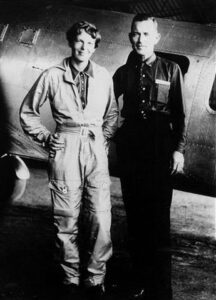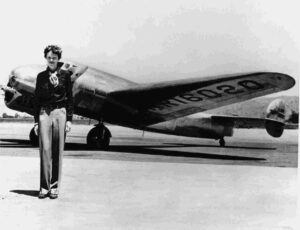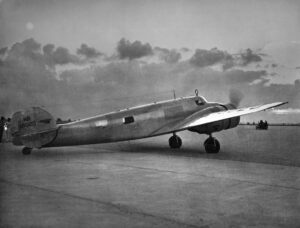The strange disappearance of pioneering aviator Amelia Earhart during her flight over the Pacific Ocean has held the world’s fascination for nearly 87 years, sparking numerous investigations, debates, and expeditions in search of answers regarding the fate of the beloved pilot. The latest addition to the search effort comes from a team of underwater archaeologists and marine robotics experts affiliated with Deep Sea Vision, an ocean exploration company based in Charleston, South Carolina. They claim to have come across a potential breakthrough that might shed light on Earhart’s story. Utilizing sonar imaging, a technology that employs sound waves to chart the ocean floor’s topography, the team has identified an intriguing anomaly lurking in the depths of the Pacific Ocean, submerged at a staggering depth of more than 16,000 feet (4,877 meters). This anomaly bears a striking resemblance to a small aircraft, prompting the team to speculate that it could potentially be the Lockheed 10-E Electra, the ten-passenger plane that Earhart was piloting when she vanished while attempting her around-the-world flight.
Amelia Earhart Disappearance, the Greatest Mystery of All Time
Tony Romeo, CEO of the company, who also boasts a background as a pilot and a former US Air Force intelligence officer. He stated, “We find ourselves presented with a unique chance to provide resolution to one of the most remarkable stories in American history.” According to Romeo, the imagery was captured approximately 100 miles (161 kilometers) from Howland Island. This island was the anticipated landing point for Amelia Earhart and navigator Fred Noonan after their final departure from Lae, Papua New Guinea. Following an extensive 16-day search led by the US government, the duo was officially declared lost at sea.
Deep Sea Vision, during its expedition, meticulously scanned an expansive area of more than 5,200 square miles (13,468 square kilometers) on the ocean floor. They employed the Hugin 6000, an advanced autonomous underwater vehicle (AUV) equipped with sonar technology for seabed mapping. Romeo revealed that the company’s expedition commenced in early September 2023 and concluded in December. He expressed his intentions to revisit the site within the year to seek further validation regarding the anomaly’s identity, which would likely involve deploying a remotely operated vehicle (ROV) equipped with a camera for closer examination. Additionally, the team would explore the possibility of retrieving the discovery from the ocean depths.
More theories on the Earhart disappearance

In a 2017 History Channel documentary, a hypothesis was presented, suggesting that Amelia Earhart and Fred Noonan had crash-landed in the Marshall Islands, approximately 1,000 miles (1,609 kilometers) distant from Howland Island. According to this theory, they were subsequently captured and taken to Saipan Island, where they were held captive and eventually met their demise. The foundation of this theory rested on a photograph from the US National Archives, featuring several indistinct figures, with investigators contending that the aviator and her aircraft were discernible in the image.
In 2016, the International Group for Historic Aircraft Recovery (TIGHAR) proposed an alternative scenario. They theorized that Earhart and Noonan survived a challenging landing on a Pacific Ocean reef but eventually perished as castaways when their attempts to send radio distress signals were unsuccessful. TIGHAR’s team argued that a skeleton discovered on the island of Nikumaroro, Kiribati, in 1940, exhibited characteristics matching Earhart’s height and ethnic background. Meanwhile, the most widely accepted theory, upheld by the US government and the Smithsonian, posits that Earhart and Noonan crashed into the Pacific Ocean near Howland Island due to fuel depletion.
The newly acquired sonar image of the presumed missing aircraft has generated considerable interest because of its close proximity to Howland Island. Dorothy Cochrane, a curator specializing in general aviation within the aeronautics department at the Smithsonian National Air and Space Museum, emphasized that Earhart’s final radio transmissions indicated increasing signal strength as she approached Howland Island, implying proximity to the island before her disappearance.
Wrapping It Up
To verify that the newly discovered anomaly is indeed Earhart’s plane, further investigation would be necessary, including the specific task of locating the aircraft’s certification code “NR16020,” which was inscribed on the underside of the missing Lockheed’s wing. In the event that the plane is found at such profound ocean depths, characterized by frigid temperatures and limited oxygen, there exists the potential for remarkable preservation. Amelia Earhart represented a prominent figure of her era and everyone was rooting for her, hoping she would successfully circumnavigate the globe. However, she vanished without a trace. It remains one of the 20th century’s greatest mysteries, a puzzle that has extended into the 21st century. Well that’s it for now, until next time remember to Be Social, Fly Private!


